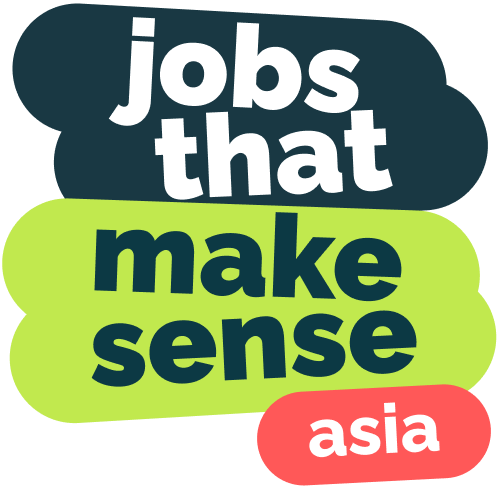Guide for a purpose-driven career change
Feeling lost about finding a fulfilling career that makes a difference?
Transitioning to an impact job might feel similar to retraining, but with some key distinctions. Here, the world's needs take center stage. Your values and motivations need to align not just with your own aspirations, but also with the greater good. The question of impact, purpose, and contribution becomes paramount.
Another difference is the vast range of possibilities. Impact jobs can be found across professions and sectors, not just in traditional non-profits. Many exist in the social and solidarity economy (SSE), associations, and smaller organizations.
In this article, I'll share some key steps to navigate your path towards a meaningful career that tackles global challenges. Reflect on these points, jot down what sparks your interest, and brainstorm actions to delve deeper.
My insights come from years of experience supporting people's career transitions at Bloomr, especially through our skills assessments.
Remember, these steps are not rigid rules. The road to a fulfilling career shift is rarely linear. There's no magic formula – no single recipe with guaranteed success.
The path to an impact job can be unpredictable. It might be long and winding, or surprisingly quick if you grab an unexpected opportunity. It might be bumpy at times, or smooth and flowing. Most often, it's a blend of reflection and action, exploration, encounters, chance discoveries, and compromise.
Prepare the terrain

1 - Take stock
Before diving in, take a moment to reflect on your current situation and motivations. This self-assessment will help you build a strong foundation and set clear goals for your journey.
Here are some key questions to guide you:
- What emotions surface when you consider your current job and your desire for change?
- What aspects of your professional life no longer fulfill you? Is it the work itself, the environment, the daily routine, or your relationships? What are you missing out on (e.g., flexibility, connection, learning opportunities, a sense of purpose)?
- What do you truly desire? What specific changes do you seek in your career? What are your aspirations?
- Imagine you stay put. What are the potential consequences of inaction?
By taking stock of these factors, you'll gain valuable insights to propel you forward in your search for a meaningful impact job.
2 - Explore your need for meaning
The driving force behind most career changes we see at Bloomr is the search for meaning.
This often stems from a desire to better align your values with your daily work. But what "meaning" means can vary greatly. It can come from your day-to-day tasks or the overall purpose of your work.
Ensuring balance, respecting your own needs, your values, your priorities, your desires and your mode of operation are just as important for sustainably cultivating meaning at work as the content of your mission or the organization for which you will work.
A few questions to ask yourself:
- What are your driving values? The ones that guide your daily decisions. What are your "anti-values" (the things that strongly oppose your principles)?
- What meaning do you want to give to your life? What does “success” mean to you, professionally and personally? What do you want to accomplish?
- What about your current job no longer makes sense to you? At what level do you feel a lack of alignment with your values? What would you need to realign yourself?
3 - Explore the notion of impact
When we talk about “impact jobs”, the term “impact” is often used as a catch-all.
Impact, okay, but on what? On which ? At what scale? What purpose ?
A few questions to ask yourself:
- Concretely, what do you want to contribute? What cause do you want to advance?
- By whom and on what scale?
- Do you want the organization you work for to have an impact, even if you don't necessarily contribute directly (for example, by being an accountant for an NGO that cleans the oceans) or do you need, on the contrary, to directly correlate your mission to this positive impact (by cleaning up the oceans yourself)?
- What will tell you whether or not the impact of your work is positive?
Know yourself better

When you build your professional life, especially at the beginning, the influence of others plays a lot on the choices you make and the directions you take.
The expectations of parents, even the feeling of family duties, the orientation of friends, the ideas received about work, the beliefs and injunctions that have been transmitted to us throughout childhood and adolescence...
To take charge of your professional life, you need to free yourself as much as possible from everything that does not belong to you, to reconnect, really, to you, your values, your desires, your needs, your convictions, your motivations deep, your tastes...
It's a lot of introspection to get to know you better and be able to make your own choices. This work is valuable for boosting self-confidence and making you feel comfortable talking about yourself.
4 - Free yourself from the brakes
The path to a fulfilling and meaningful professional life is paved with insecurities, fears and beliefs that sometimes prevent you from moving forward serenely. It's normal...but it's not inevitable.
A few questions to ask yourself:
- What is holding you back, weighing you down, scaring you in your desire for change? Fear of making a mistake, fear of the judgment of others, of insecurity, of failing, of starting from scratch, of financial risks, of going back to school, of the unknown, of not being able to, of the reactions of the surroundings…
- What's stopping you from taking action?
5 - Your desires, ambitions and aspirations
- What life do you wish to have? What are your priorities?
- What is your vision of success?
- What are your dreams?
- How does work fit into this life? What place do you want to give it?
6 - Your personal needs
- What are your personal obligations that you must take into account to plan your professional life? For example, do you have geographic requirements? Family?
- What does this mean in terms of flexibility? Hours? Of rhythm? Of organization?
- What does this imply in terms of financial need? How much do you really need to live the way you want? What would be your ideal salary? And your subsistence minimum?
7 - Your professional needs
- What is essential for you, on a daily basis, to feel good about your job?
- What kind of people do you want to meet on a daily basis (colleagues, clients, partners, etc.)? What type of managerial relationship do you want to have?
- What do you want to be recognized for? By who? How? Or what?
- What does your ideal work environment look like (location, setting, corporate culture, working conditions, hours, atmosphere, etc.)?
- How much do you need to be stimulated, to learn continuously in your work? On what subjects?
- Do you have any dealbreakers when considering a new job?
8 - Your resources
Assets, talents, skills, qualities, abilities, know-how, know-how… so many resources that make you unique, and from which you will be able to draw to express your potential.
Identifying them is not always easy, but essential to determine how you want to express your resources and put them to use in your work.
A few questions to ask yourself:
- What can you do? What do you do easily? Naturally?
- What do you like to do in what you can do?
9 - What drives you
- What are your tastes? What do you like to do?
- What tasks and activities interest you? attract you? Gives you pleasure? Make you feel good, in your element?
- What drives you? Give you energy? Make you feel alive?
Define your project

The big question when thinking about a professional change is of course: concretely, where to go?
A good knowledge of oneself and one's aspirations provides valuable elements to guide one's exploration and make one's choices.
Finding leads is not always easy, however.
10 - Understand the needs of the world
Finding an impactful role requires considering not just your skills and interests, but also the world's needs. Understanding these needs is crucial for aligning your talents with a positive contribution.
Here are some questions to guide your exploration:
- What skills and experience are most needed to address the kind of impact you want to make?
- What initiatives are already underway to tackle the issues you care about? Where are the gaps or opportunities for improvement?
- Consider your local community. What specific environmental and social challenges exist in your area?
11 - Open your horizons
Expanding your horizons and discovering unexpected career paths can feel daunting. We often get stuck in our daily routines and social circles, limiting our exposure to new possibilities.
Here are some ways to break free and gather inspiration:
- Provoke encounters, especially with people you are not used to seeing. Ask them about their job, their daily life, their challenges. Use your close network, dare to contact strangers on LinkedIn, attend fairs, networking events, associations..
- Get inspired by testimonials found in the media via podcasts, shows or even films
The idea is to raise the antennas to capture everything you can around you, without filtering at first, taking what comes and what it inspires you.
Over time, you will collect ideas for professions, sectors, fields that appeal to you or seem aligned with what you are looking for.
This can be a radically different track from what you have done so far, such as an idea of internal mobility in your company, a side project, an activity in addition to what you already do (slashing), or an entrepreneurial project, a change of organization, or the transition from salaried to freelance.
Write down everything, everything, everything that crosses your mind.
12 - Sort out your ideas
When you have lots of ideas, lots of desires: how to sort them, decide between them and choose?
To evaluate the different ideas, you need to dig into:
- Your understanding of the business and the sector. For this, nothing beats a good business survey to discuss with professionals.
- Opportunities, by zooming in on the areas that interest you. Who recruits? What type of position? In what conditions?
- The feasibility of each project. In relation to your current skills, training, etc. what do you need to make this project a reality? Are you able to get it? In what time frame? Averaging? Is this acceptable for you?
- The financial implication of this reconversion: how can you finance it? what does this imply? What devices or assistance do you have access to to help you cover the financial cost of this retraining?
- The adequacy between your project and your desires, your constraints, your priorities, your strengths… Particular focus on the entourage: what are the potential consequences of this project on your personal and family life?
- The attractiveness of the project: how much does the prospect of this project inspire you and make you want to? What do you like, attract you? What makes you doubt?
Start the next step

13 - Define a project
So, what's your next move? It's time to solidify your chosen path by clearly defining your impact project.
Articulate it concisely so you can readily share it with others and spark conversations. Remember, the more you talk about your goals,the more you open doors to unexpected opportunities that can propel you forward on your journey!
14 - Realize your project
You need to have an action plan, to realize the project you have just defined.
What steps do you need to go through for this project to succeed?
The path can sometimes seem very arduous to achieve your goals. The technique of small steps is then very useful: cut the steps into small actions and spread it over time.
Put all the chances on your side

Because the process of professional life change can take time, you need to stack the odds on your side to go the distance.
Two keys: regularity and support.
To begin, free up regular time to move forward in your thinking, for example by planning time in your agenda.
15 - Find allies
To go the distance on a professional life-changing project, it is important to find allies: people you trust, who will be able to give you constructive and benevolent feedback to help you move forward.
16 - Have company
Several solutions exist to be accompanied by professionals. Skills assessment, coaches, public services…
The most classic way to support you in your reflection is the skills assessment. Fundable by the CPF, you will find a multitude of different formulas...individual, collective, face-to-face, remote...
Pôle Emploi and APEC for executives also offer support services if you meet the criteria to benefit from them.
The resource: jobs_that_makesense_asia website presents several skills assessments, including our Bloomr skills assessment, which has the particularity of being 100% remote and accompanied by individual coaching sessions.
I can't resist the urge to give you two last pieces of advice for the road:
Be in the action
We tend to mentalize the retraining process. Ask the right questions, find the right answers, fill in a column table for and against, give points, do the calculations and that's it! In reality, there is a lot that is played out in action, in lived experiences, encounters, unexpected opportunities. At some point, it is important to move away from the screen, the paper, the pen, and the analysis to test life-size. It is a question of posture, which combines curiosity, audacity, optimism and movement.
Follow your intuition
Again, there's the plan you laid out on paper…and the confrontation in real life. The action plan is essential to draw the road to your goal, but it is not a fixed route from which you cannot stray. It's a guideline.
Also leave room for serendipity, happy coincidences, the nudges of life that may make you take shortcuts or cross roads.

